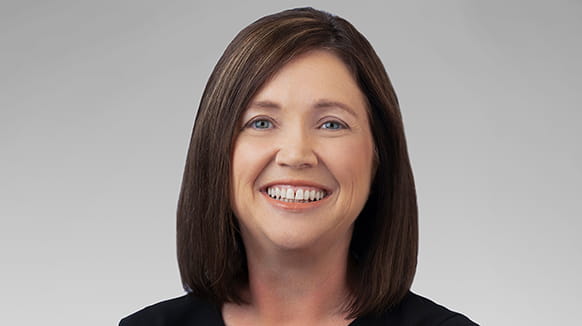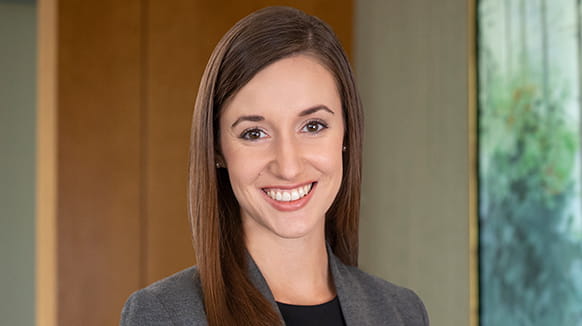Haynes Boone Partners Debbie McComas and Angela Oliver are the “duo to beat at the Federal Circuit,” according to Law360, having won all seven patent appeals they have argued this year. The legal news outlet highlighted the success and strategies of their latest arguments and explored the careers that have developed them into the attorneys they are today.
Read an excerpt below:
Debbie McComas and Angela Oliver have emerged as the duo to beat at the Federal Circuit, as the Haynes Boone partners have taken victories in each of the seven patent appeals between them they've argued this year.
Dallas-based McComas is approaching 30 years at Haynes Boone, and D.C.-based Oliver graduated from law school less than a decade ago, but even so, they have formed a tight partnership.
"We work side by side, day in day out, on pretty much every Federal Circuit case that we have and cases outside the Federal Circuit as well," McComas said in a joint interview. "It would literally be the same if she were next door. We really don't miss a beat."
So far this year McComas has argued five times for Unified Patents LLC, X Corp. and Acufloor LLC, and Oliver has argued twice for Unified Patents. The Federal Circuit returned six clear victories and one indirect one.
The wins include persuading the court in May to revive Acufloor's infringement suit in Florida against flooring companies EvenTile Inc. and Forpac LLC in a claim construction dispute. Then in June, the appeals court upheld a Patent Trial and Appeal Board decision invalidating claims in a DivX LLC streaming patent challenged by Unified Patents.
The indirect win was a joint appeal in litigation where Snap Inc., Meta Platforms Inc. and X had successfully invalidated a Xerox Corp. content delivery patent at the PTAB. The Federal Circuit upheld the invalidation, but only by addressing a dispositive argument from Snap.
That case exemplified McComas' skill, Haynes Boone partner Scott Jarratt said. Snap and Meta went first in oral arguments, and at McComas' turn to argue for X she made a rare one-word argument: "Ditto."
"By the time the judges got to her, she could tell [they] were squarely on her side and had heard enough," Jarratt said. "The confidence to have the insight and then to use it in a clever way, that's her in a nutshell."
Cooley LLP partner Heidi Keefe was in that courtroom, arguing for Meta. In addition to courtroom overlap, Keefe said she's worked with McComas and Oliver as co-counsel or to advise each other in litigation when they share a client.
The "ditto" moment stood out to her as powerful.
"I deeply respected Debbie's ability to suss out how important 'less is more' was to that panel of judges at that moment," Keefe said. "She rightfully has a confidence in her ability to read a room that inures to her client's benefit. I always admire when a lawyer is willing to shut up instead of talk themselves into a problem."
Jarratt was Oliver's official mentor when she was a summer associate in 2015, about two years after the PTAB issued its first decision in an inter partes review.
"We had assigned her an IPR project kind of early on in a technology field that was not her background, and the work product was incredible," Jarratt said. "[It was like] she'd been doing it for years, which is really unexpected because not many people had been doing it for years."
Oliver's focus at Baylor University was bioinformatics and chemistry. She graduated from Southern Methodist University's Dedman School of Law in 2016 and clerked for Texas U.S. District Judge Rodney Gilstrap and Federal Circuit Judge Sharon Prost.
"Angela Oliver was an exceptional law clerk in my chambers," Judge Gilstrap told Law360. "She checked all the boxes. Not only was she intelligent and insightful, but she routinely showed a level of maturity and sound judgment that doesn't come from a classroom. I am not surprised, in the least, that she has and continues to excel in our profession."
Like Judge Gilstrap, attorneys repeatedly praised Oliver when talking to Law360.
"Angela has an unrivaled clarity of thought," said Unified Patents general counsel Jonathan Stroud, celebrating the firm for "having the foresight to see that."
"A lot of brilliant associates get to argue one thing or with another partner, but they're not let loose," he added. "Kudos to them for recognizing what they had and using it."
McComas said Oliver was immediately thinking and acting like a partner and became one in 2024, the first year she was eligible.
"The only thing I was able to do to help Angela was turn her brain from being the neutral court clerk to being an advocate, and that took just overnight," McComas said.
McComas said the pair are successful because they can second-guess each other.
"It's the ability for us to scrutinize each other in a way that we can put ourselves in the head of the court," she said. "What's the court going to be concerned about? By the time we file our briefs, we've already answered those questions and filled those holes."
McComas comes from a much different background than Oliver. Rather than breaking in as a patent-focused attorney, she was centered more on appeals in general.
"When the [America Invents Act] came on, I suddenly was the person that started naturally taking on the IPRs because I had the ability to translate complicated stuff into English," she said. "My knowledge was a bit like the Federal Circuit judges."
Women make up a small percentage of nongovernment attorneys arguing at the Federal Circuit, and a two-woman team is even rarer. That doesn't seem to concern clients, McComas said.
"It's our win rate," she said. "It doesn't matter what gender you are when you're that successful in the court and have earned the respect of the court."
A key example of the women supporting each other came in July 2023, when Oliver was set to argue a PTAB appeal on behalf of Apple Inc.
"Sometimes we can tag-team it," McComas said. For example, "Maybe someone has their baby early, and the other one has to learn the case and argue it on short notice."
"Literally," Oliver said, as both women laughed. "We were about two weeks before the argument, and my first son decided to come almost a month early. And so all of a sudden, I called Debbie and said, 'You're going to have to argue this case in two weeks. Sorry, I'm in the hospital.'"
They're also working closely now with Laura Vu, a San Francisco associate who joined the firm in January 2024 after a clerkship with Federal Circuit Judge Raymond Chen. Vu, a former patent examiner, said she was integrated into the group from day one.
"It's like working with your friends and your champions and your mentors," Vu said. "It's all rolled into one."
Read the full Law360 article here.

